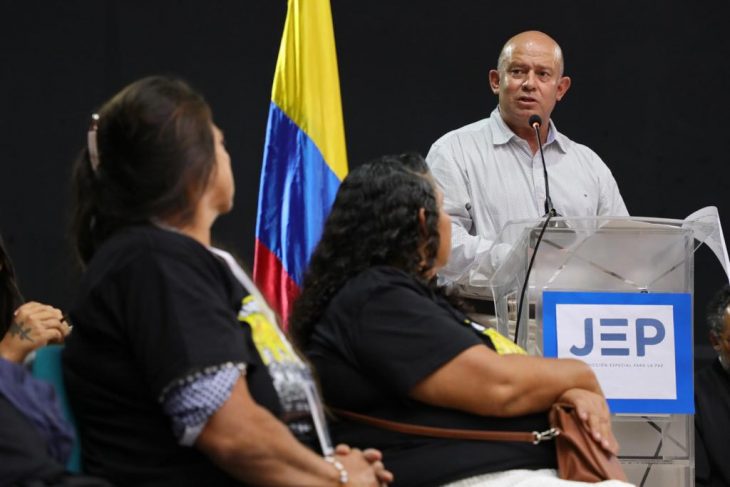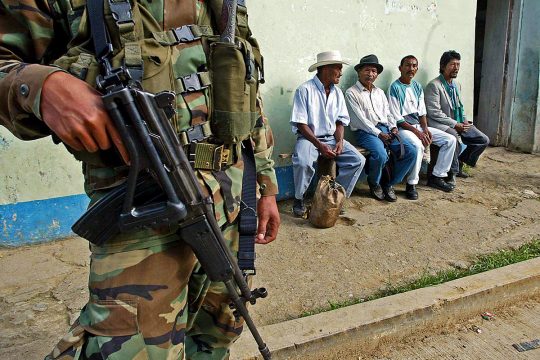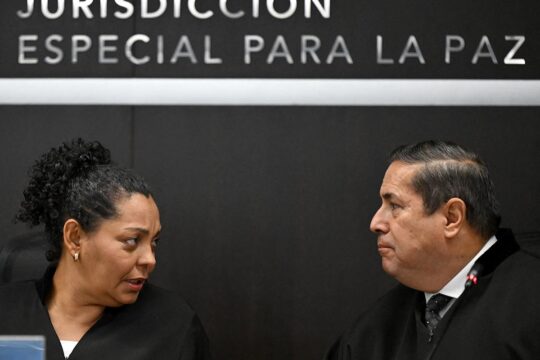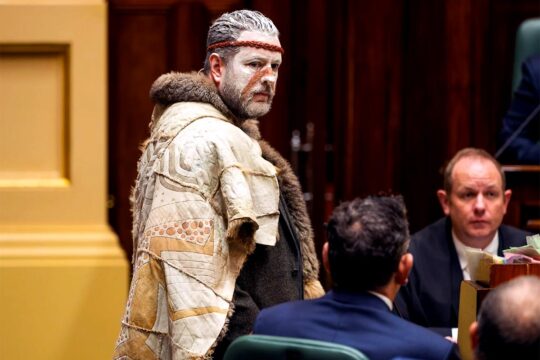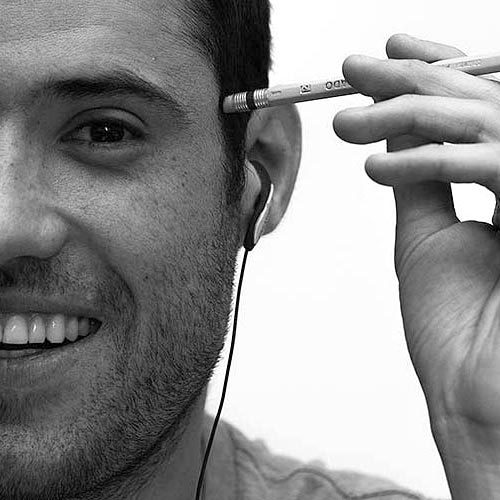"The people murdered were humble peasants, workers, fathers, husbands, brothers, good human beings, Colombian citizens. They were not rebels, they were not terrorists, they were not bandits and they were not delinquents, as we unfortunately made them out to be," said Santiago Herrera, a retired colonel and former commander of the 15th Mobile Brigade of the Colombian Army, in a grave voice. "There was a criminal gang within the brigade of which I was aware, but which I neither denounced nor investigated," seconded Rubén Darío Castro, another retired colonel who worked in the same military unit. "These were not mistakes; they were not collateral damage as we said. These are not excesses of force. They clearly were assassinations," acknowledged Álvaro Tamayo, also a retired colonel and former leader of the Francisco de Paula Santander 15th Infantry Battalion. "It led me to end up becoming a murderer," retired sergeant Sandro Pérez, more tersely, put it.
In front of them people listened amidst a silence so overwhelming that from time to time the tolling of the bells at Ocaña cathedral, a block and a half away, reached the Francisco de Paula Santander University’s theatre. Amid the same mutism, the indictees – seven officers, three non-commissioned officers and a civilian – listened to some thirty relatives of the young men aged 25 to 35 who were murdered a decade ago in different parts of the mountainous region of Catatumbo. Many of them, in fact, died a few kilometres away from the auditorium where on April 26-27 the two-day public hearing was taking place, in one of the most tangible achievements so far by the Special Jurisdiction for Peace (JEP) and the transitional justice system born after the Colombian government's peace agreement with the Revolutionary Armed Forces of Colombia (FARC) in 2016.
It was an unprecedented scene in Colombia. The ten former Colombian army officials stood at a lectern and admitted for the first time in front of the victims’ families that they’d been responsible for murdering 120 civilians and then illegally passing them off as rebels killed in combats that never existed. One by one, they took the microphone to say that they owned up to some of the most reproachful charges in international justice. Those 120 extrajudicial executions, plus 24 forced disappearances and one attempted assassination – all of which occurred between 2007 and 2008 in Catatumbo – were indeed qualified by the JEP as war crimes and crimes against humanity.
Victims' heartfelt pleas to their perpetrators
The victims had long awaited this moment. "Today is the day to express the feeling that I’ve held back for 15, almost 16, years," Soraida Navarro, whose father Jesús Emilio is still missing, told them.
One large group of victims who spoke on the first day hailed from remote villages throughout Catatumbo. Another who did so the following day came from five cities to the very place where years ago many of them had to claim the remains of their sons, some of them tricked from as far away as Soacha, 635 kilometres away, before being killed. United by their tragedy, one that has horrified Colombians for 14 years and is known by the euphemism of 'false positives', the victims opted for a uniform that day.
They wore black T-shirts, with a yellow illustration in the centre: the mural that the Mothers of False Positives, one of the victims' organisations, has positioned as a symbol of their search throughout the country (and often erased from Colombian streets almost as soon as it is painted). It features the stenciled faces of 14 senior army officers from the past two decades, including General Paulino Coronado who was sitting right in front of them that day. In large letters appeared their long-standing slogan, "Who gave the order?", along with a number they only adopted as their own last year. It is 6,402, for the amount of civilians who - according to the JEP - were killed by the military following this macro-criminal pattern between 2002 and 2008, during the government of President Álvaro Uribe.
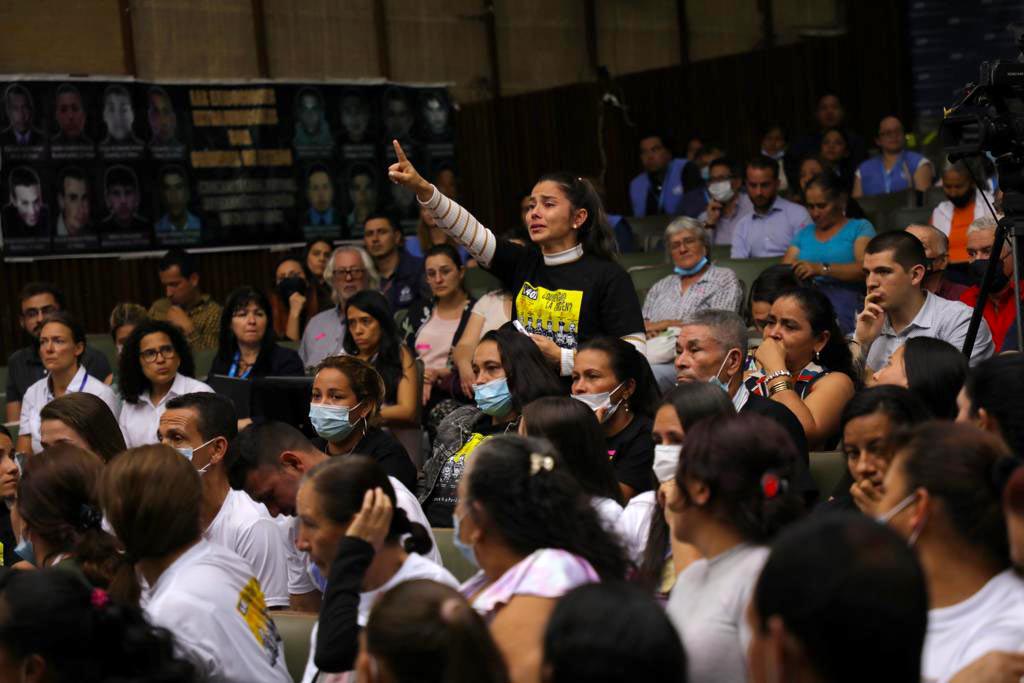
Some in person, others by video and one even from an exile forced by threats related to this case, the victims respectfully stated their demands. In doing so, they showed them the faces of their relatives, in photos hanging from their chests, on shirts tucked underneath their black ones and, in one case, tattooed on an arm.
Why is the person signalled over the murder of Joselin Jaimes still an active major, asked his daughter Maira. How could they kill a psychiatric patient like his brother Martín, questioned Álvaro Marulanda. Would they go to Congress to stop the promotions of those involved, asked Gloria Martínez, who had to quit her job at a soap factory after the murder of her son Daniel Alexander. Why did so many other state agencies, like the military criminal justice system or the Attorney General's Office, never suspected anything, asked Jacqueline Castillo, president of the Mothers and sister of Jaime. Could they believe the cruel irony that Yonny Soto had served in the military until just five months before he was killed by colleagues from the same institution, asked his mother Zoraida Muñoz.
“My heart is purple with grief”
One victim after another told them of the sad legacies their actions left, from orphaned children to cemetery debts and mistrust in the state that was meant to protect them.
In one of the most moving moments, Villamir Rodríguez – a peasant and perhaps the only person known to have escaped a false positive – recounted how they left him for dead after shooting him, planting a gun next to him and reporting the death of 'a subversive' over the radio. Pointing to his severed arm, he told them that "I can't stand to work a full day because of the damage done to me".
Carmenza Gómez, mother of Víctor Fernando, complained that they’d received threats just for speaking out. Claudia Barrientos, sister of Javier, told them that Catatumbo locals could not see them as heroes. And Antonio Peña, brother of Olivo, said his "heart was purple with grief".
Almost everyone asked them to name their superiors who were involved. "Uncover the heads of those responsible. Don't go down alone," implored Flor Hernández, mother of Elkin Gustavo Verano. And all, absolutely all the victims who spoke in Ocaña, pled for an urgent task: to clear their names and, incidentally, that of their much maligned region.
The Army officials responded, sometimes directly and sometimes obliquely. At times they assumed the full horror of the "Machiavellian events we created", as a fourth colonel, Gabriel Rincón, put it, and at times they fell back on euphemisms such as 'the facts' or 'the actions' to speak of premeditated and disguised killings in the midst of an internal armed conflict whose rules of engagement they’d deliberately ignored.
“Even if it was a lie”, it had to “look good”
Perhaps the most striking aspect of the public hearing was the language chosen by the 10 defendants. They spoke of an "organised criminal apparatus", a "criminal structure" and a "regrettable criminal pact". This was no coincidence. The accusation in which the JEP laid down its charges against them in July last year speaks of "criminal organisations embedded within military units". They borrowed many of its terms - or at least some close ones: "false combat casualties", "illegitimate combats" and "innocent young men (...) handed over, murdered and reported as combat kills and operational results".
Likewise, some went from barely answering the JEP´s questions three years ago to taking ownership of its indictment, narrating in their own words from the different modus operandi and illustrative cases to the way in which they divided the tasks among themselves.
Corporal Néstor Gutiérrez, unique among the group because he’d been the only one to approach the courts of his own accord years ago to denounce his deeds and who has been threatened several times for doing so, recounted how he paid a woman who sold marijuana in a brothel to draw up a list of people. Sergeant Pérez described how he searched for young men in Soacha, deceiving them with promises of non-existent jobs and withholding their documents so that they could vanish without a trace. Civilian Alexander Carretero complemented him, relaying how these men arrived at his Ocaña home, only to be picked up by their executioners. Several pointed out that they planted weapons - from a cache that they never reported according to some, provided by the right-wing paramilitaries said another - to stage the crime scenes.
Major Daladier Rivera told how he forged intelligence reports that accused the victims of being rebels or accomplices, despite the fact that he had never - he admitted - been trained in intelligence. Colonel Rincón explained that his role was to "draw up documents that gave a veneer of legality to these false operations", so that no state agency could suspect that they were not real. Major Juan Carlos Chaparro admitted that he only cared that his documentation on military operations, "even if it was a lie, looked good".
A validation of JEP’s findings
Colonel Castro recounted how he allowed reserved army expenses to pay for false reports by informants and admitted that, although he was in meetings where anomalies were raised, he did not sound any alarms. Colonel Herrera detailed the pressures and motivations he used, including holidays, commissions abroad and flying courses to negative résumé annotations.
Some responded to specific questions from victims. Corporal Gutiérrez admitted to Sandra Barbosa that he had called other soldiers to take her brother Javier Peñuela from a shop one day that he had gone down to the village to have a doctor pull a tooth.
There were particularly cruel tales. Gutiérrez told of having shot a trustful Wilfredo Quintero in the back, while his colleagues fired rounds into the air to simulate a supposed combat. Colonel Tamayo, who was a former aide-de-camp to ex-President Uribe, stressed that his responsibility was for failing in his duties as commander, but at one point explained that "I agreed to this proposal and I gave my approval for murders then presented as fake combats".
Their stories, with their emphases and blind spots, translated for Colombian society - and validated - the already ground-breaking findings of the JEP on what it termed "fictitious operational results", "increasingly sophisticated cover-ups" and "a division of criminal labour".
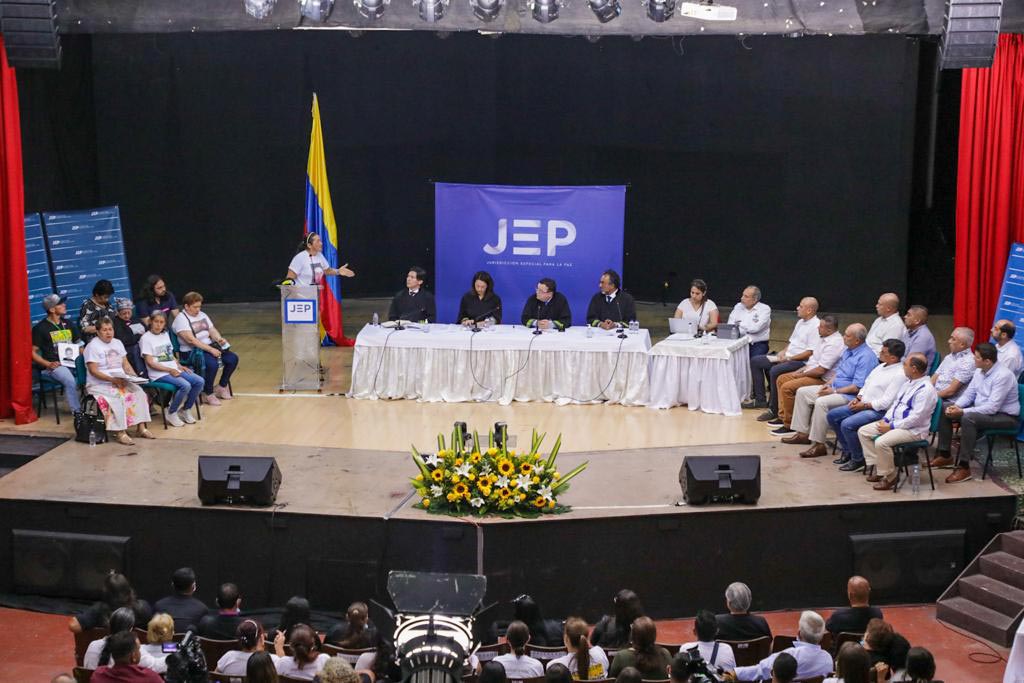
Judge Arbour’s advice
Ultimately, after four years of investigation, the Colombian special tribunal is finally showing that it may have an answer to one of the long-standing dilemmas that transitional justice and international criminal justice mechanisms often face: how to get defendants to acknowledge not just their crimes, but also their victims´ suffering.
"We spent a lot of time trying to prove the guilt of those responsible: we succeeded and convicted them, but then they went out and said they were innocent and that re-victimised the victims", Canadian judge Louise Arbour told the government's peace negotiators a few years ago, when they were in the midst of talks with the FARC. Arbour had been a prosecutor at the international tribunals set up by the UN for Rwanda and the former Yugoslavia. And she also had a possible answer: "Create incentives for acknowledgment," she urged them.
Her Colombian interlocutors heeded her advice and the result is a two-track transitional justice system. If those accused of serious crimes own up to their responsibility, in addition to providing truth and personally redressing victims, they can receive 5-to-8-year sentences in a non-prison setting. If they fail to do so, their case is transferred to an adversarial proceeding and, if found guilty, would face 15 to 20 years in prison.
Ocaña marked the first time that one of the big JEP cases has reached the public hearing stage. Thus the military became the first to assume their responsibility, not only in writing as they did at the end of last year, but orally too. These acknowledgements, the justices explained to them, had to incorporate three elements. A legal one, fulfilled by stating the exact charges and indicating that they accept them. A factual one, which involves recounting some of those murders or behaviours, including specifics on time, manner and place. And a restorative one, for which there was no script but which had to show an understanding of victims' losses, of the pain caused by taking away their family members, and of the long-term impacts of those crimes.
All of this, of course, had to be done in an empathetic and respectful tone. "We are looking for explanations, not justifications," warned Catalina Díaz, one of the three justices leading the case and the one in charge of the Catatumbo investigation.
When catharsis coexists with defiance
Even though all the indictees in the Catatumbo case accepted the charges – unlike the other sub-case of false positives in the Caribbean, in which three of the 15 accused officials have rejected the JEP's findings – the Ocaña hearing showed that not all are fully willing to own up to their role or the failings in their command. And that oftentimes in these restorative scenarios, catharsis coexists with defiance.
On the first day, Sergeant Rafael Urbano made a convoluted intervention in which, despite accepting his responsibility, he tried to muddy one of the first soldiers to denounce the false positives and even insinuated to Villamir Rodríguez, the survivor, that he had helped him get out of the hospital. After a reprimand for not providing concrete details, the three magistrates asked him incisive questions about four murders in which he was involved and to which he had to admit. "I am a murderer, it is not my pride to say so," he was finally nudged to reply.
Even more disconcerting was when General Paulino Coronado, the highest ranking official so far to accept the JEP charges and the last speaker, launched into a 40-minute speech - twice his allotted time - in which he placed more emphasis on his ignorance of the murders and the measures he put in place after learning of them than on the crimes committed by his men or the grief of the families present that day. The justices finally interrupted him and a brief adversarial scuffle ensued. They questioned him about a December 2007 meeting at a theatre in Ocaña, which several human rights organisations convened to tell him about a series of human rights violations, including several extrajudicial executions. That meeting was one of the pieces of evidence the JEP used to argue that Coronado had known about and failed to act, as well as the breaking point where, according to the tribunal, soldiers stationed in that region went from killing local peasants to murdering young people from other places, some of them with mental illnesses or problematic drug use.
After a recess, the magistrates warned him that they would have to assess whether his acknowledgement was satisfactory and that they might ask him to extend it. A day later, in an interview with El Espectador, Coronado - now without the moustache that characterised him during his military years – nuanced his words, underscoring that "memory is fragile" and that he "accepts whatever victims say".
Those two interventions were however more the exception than the rule. After meeting with the victims twice in private, all of their colleagues emphasised their suffering, the traumas left by those murders and the disproportionate burden placed on women, who have been both seekers and carers.
"I recognise in you," Colonel Tamayo told them, "that tortuous road full of suffering as you searched while constantly pleading for justice, and that in each journey you undertook you were re-victimised not only by us, your perpetrators, but also by the ordinary justice that didn’t believe in your desperate claims about the disappearance of your loved ones."
This sets a high bar for the seven former FARC leaders who on May 31st, and over three days, will have to face - and apologise to - the victims of 21,396 kidnappings carried out by that rebel group over two decades, which the JEP also deemed war crimes and crimes against humanity.
“I dreamt of this moment”
"I never thought I’d see them saying 'Yes, I gave the order. It was so-and-so who executed him'," said María Amparo Suárez, whose son Luis Alberto Sandoval - killed at the age of 21 - was working on a cocoa plantation in order to continue studying criminology. “It has been very satisfying.” Several victims felt that their relatives’ names were vindicated. "What makes me happiest is that my brother Jaime Estiven Valencia's name has been cleared," Anderson Rodríguez, a calisthenics athlete, told me as he stretched his muscles to prepare his speech. "It was a surprise for me that they named my dad," Leidy Jaimes confided to me.
"I dreamt of this moment. That they stood up and told the whole of Colombia and the world that our boys were not rebels or subversives," Blanca Nubia Monroy told me, as she motioned to a tapestry hanging on the wall of the theatre in Ocaña where, with scraps of cloth, she had woven the story of her son Julián Oviedo, taken from Soacha and killed in March 2008.
She pointed at it with her left arm, on which the small tattoo of a scale could be seen. They weren’t the scales of justice, but a copy of her son’s tattoo. But they might as well be.
THE CASE BEGINS TO MOUNT
After receiving victims' observations, JEP justices in charge of the false positives case will synthesise their findings in an indictment that will be sent to the highest instance of the JEP for sanctions to be decided. In a few months, almost five years after it began operating, the first ruling of the transitional justice system will be announced.
At the same time, the probe will continue to move forward: on the one hand with indictments in the other four remaining regional sub-cases and, under the so-called "bottom-up" approach, towards the patterns of behaviour and institutional norms and culture that allowed these crimes to fester at the national level. This means that it will move from accusations against officers in command at the regional level to those at the top, potentially including those in leadership positions in the armed forces and the Ministry of Defence during those years.
The name that came up most often in the Ocaña hearing was that of General Mario Montoya, Army commander at the time and famous for telling his soldiers, according to accounts before the JEP, that he had no use for captures and asking for 'litres of blood'. Several pointed to him, by name or position, for exerting permanent pressure over the radio, making his brigades compete and rating commanders according to a single metric: combat casualties "at any cost". Something similar was said of Generals Carlos Ovidio Saavedra and José Joaquín Cortés, also their superiors.


